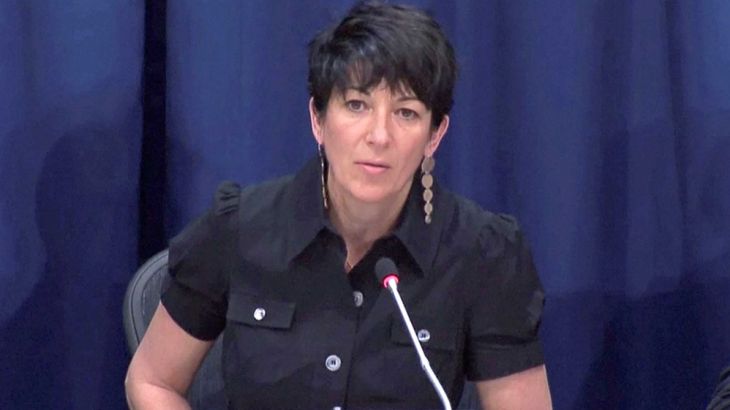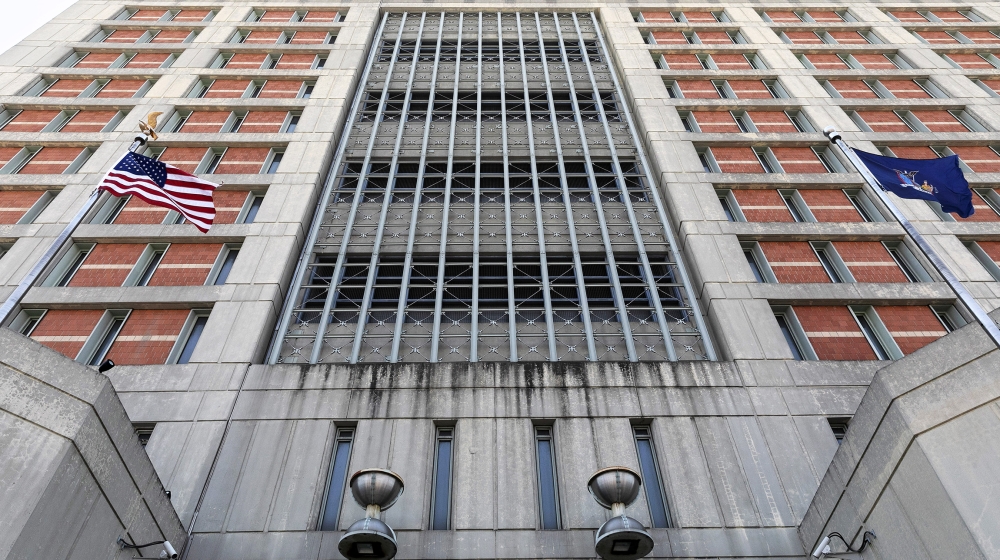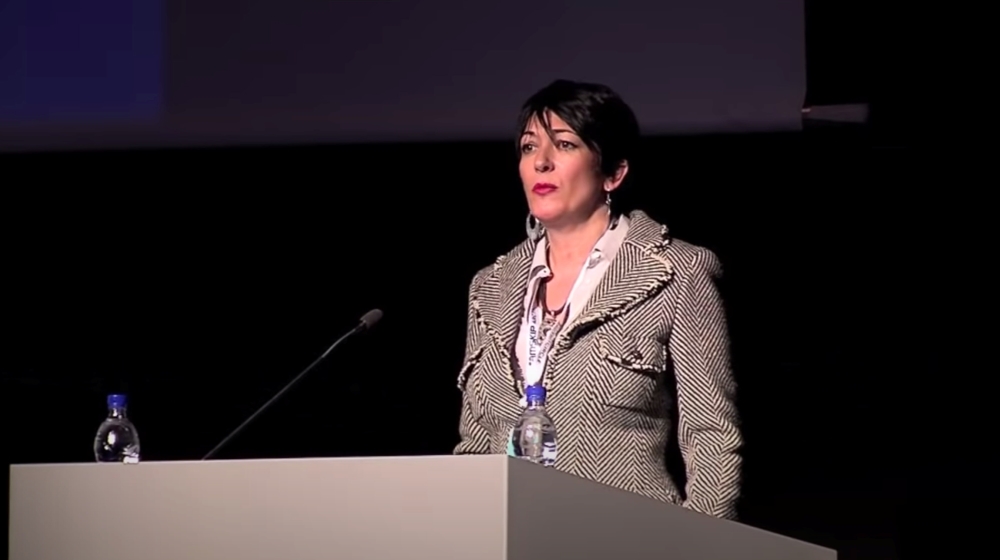US judge to decide whether Ghislaine Maxwell deserves bail
Maxwell is expected to plead not guilty to six criminal charges including perjury and sex trafficking.

A United States judge is expected to decide on Tuesday whether to grant bail to Ghislaine Maxwell, Jeffrey Epstein’s longtime associate, who has been charged with luring young girls so the late financier could sexually abuse them.
US District Judge Alison Nathan in Manhattan is set to handle the arraignment of Maxwell, who prosecutors accused of helping Epstein recruit and eventually abuse girls from 1994 to 1997, and lying about her role in depositions in 2016.
Keep reading
list of 4 itemsNigeria’s women drivers rally together to navigate male-dominated industry
Members of London’s Garrick Club vote to let women join for first time
Why has Australia declared a ‘national crisis’ over violence against women?
Prosecutors on Monday also described efforts they said Maxwell used to try to avoid being captured.
Maxwell, 58, is expected to plead not guilty to six criminal charges, including four related to transporting minors for illegal sexual acts, and two for perjury.
Prosecutors want Maxwell detained, calling her an “extreme” flight risk with no reason to stay in the United States. Maxwell’s lawyers are seeking a bail package including a five-million-dollar bond, and home confinement with electronic monitoring.

Maxwell was arrested on July 2 in Bradford, New Hampshire, where authorities said she was hiding out at a 156-acre (63-hectare) property she bought last December in an all-cash transaction with her identity shielded.
Lawyers for Maxwell said she moved there, and changed her phone and email address, to escape “unrelenting and intrusive media coverage”.
But prosecutors said on Monday that when FBI agents went to arrest Maxwell, they had to forcibly enter her home, where she hid in an interior room, and found a mobile phone wrapped in tin foil in an apparent effort to evade detection.
Maxwell also used former British military personnel to guard her in New Hampshire, prosecutors said.
“There should be no question that the defendant is skilled at living in hiding,” prosecutors said, adding that her wealth and multiple citizenships – American, French and British – also supported the need for detention.
Maxwell has been held since July 6 at the Metropolitan Detention Center, a Brooklyn jail, and is expected to appear by video conference at the 17:00 GMT arraignment.
Lawyers for Maxwell also have argued that bail was justified because she might contract COVID-19, the disease caused by the novel coronavirus, in the Brooklyn jail.
Her lawyers have previewed Maxwell’s possible defences.
These include that her alleged misconduct occurred long ago and would be hard to prosecute, and that she was shielded by Epstein’s 2007 plea agreement with federal prosecutors in Miami, which covered “any potential co-conspirators”.
Epstein was charged last July with sexually exploiting dozens of girls and women from 2002 to 2005 at his homes in Manhattan and Palm Beach, Florida. He hanged himself last August 10 at age 66 in a Manhattan jail.
Meanwhile, women who said they were victims of Epstein have spent 12 years trying to undo an unusual plea deal that spared the deceased financier from federal prison. Now, their efforts could sink a key legal defence for Maxwell.
The 2007 deal allowed Epstein to plead guilty in a Florida court to soliciting minors to engage in prostitution and serve just 13 months in county jail.
The once-secret agreement included nonprosecution protection for unidentified co-conspirators such as Maxwell, a provision that US lawyers since have acknowledged in court was unprecedented.
Maxwell’s lawyers said in court papers Friday she intends to argue she cannot be prosecuted because of the agreement, a defence Manhattan federal prosecutors on Monday called “absurd”.

The government charged Maxwell with luring and grooming minors for sexual abuse by Epstein at his mansions in Florida, New York and New Mexico, as well as at Maxwell’s London residence, in the 1990s. She is also charged with perjury from 2016 testimony in a civil case.
The 2007 plea deal also came up last year when Epstein was charged with child-sex crimes by Manhattan federal prosecutors, who said the Florida deal did not protect Epstein in New York. Before the issue could be resolved in court, Epstein was found hanged in a Manhattan jail while awaiting trial. His death was ruled a suicide.
Several alleged victims of Epstein have been challenging the plea deal since 2008 arguing it violated the Crime Victims Rights Act (CVRA) by concealing the Epstein plea and nonprosecution agreement until after it was signed.
Had the alleged victims been informed of the deal, which they argue was their right under the CVRA, they could have tried to prevent a judge from approving it.
The plaintiffs are seeking to invalidate the deal and the provision that protected co-conspirators, but after Epstein died a federal judge tossed their case.
Epstein plea deal
That ruling was upheld by a three-judge panel on an appeals court in Atlanta this year, which ruled 2-1 that the CVRA had not been triggered because Epstein was never charged with a federal crime.
The alleged victims have asked the full Atlanta federal appeals court to revive their case and determine if the lower court wrongly refused to invalidate the plea deal, said Paul Cassell, who represents alleged Epstein victim Courtney Wild in the CVRA case.
“If the agreement is ripped up, she can’t get to first base,” said Cassell, who is also a law professor at the University of Utah, former federal prosecutor and former federal judge.
On Monday, prosecutors dismissed Maxwell’s plea deal defence. In a court filing, they said her crimes were committed before and after the timeframe of the plea deal, Maxwell was not a named party to the deal and argued prosecutors in New York are not bound by their counterparts in Florida.
Retired Harvard Law Professor Alan Dershowitz, who helped defend Epstein in 2007, said Maxwell could counter each of those arguments. “When the United States government makes a promise, it’s binding all over the country,” he said.
The alleged victims have garnered noteworthy support for their appeals case, including from US Senator Dianne Feinstein, a Democrat, and former Republican Senators Orrin Hatch and Jon Kyl, authors of the 2004 CVRA law.
The trio filed a brief urging the Atlanta federal appeals court to revisit the Epstein plea deal and CVRA case. “This miscarriage of justice,” they said of the agreement, “is precisely what the act prevents.”